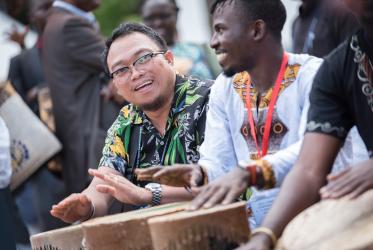“The speed with which you run depends on what is chasing you.” One of Ezra Chitando's favorite African proverbs also captures his beliefs regarding the church's long-term commitment to meeting HIV-related challenges.
As people are chased by the devastation of HIV and AIDS, churches have had to increase their speed in responding, he says. The Ecumenical HIV and AIDS Initiative in Africa (EHAIA) has played a prominent role in encouraging and accompanying churches to as they become increasingly visible in the overall response to HIV.
“From the initial denial and silence,” he says, “we are now witnessing remarkable progress.”
He believes EHAIA has contributed to a “monumental awakening” by, among other strategies, providing quality theological literature, mobilizing men and boys, and using Contextual Bible Study (CBS).
Chitando joined EHAIA in 2005 as a theology consultant who focuses on the Anglophone region. But he had been advocating for a change in church attitudes toward HIV and AIDS for many years before. “In a sense, I was in EHAIA before I was in EHAIA,” he says.
Before joining EHAIA, he published academic articles on mainstreaming HIV in theological education. He also contributed many entries to Africa Praying (2003), a publication edited by Musa W. Dube, his predecessor in EHAIA.
AfricaPraying is widely regarded as a milestone in the transformation of theological responses to HIV because it demonstrates that churches are willing to change their attitudes towards HIV if they possess relevant theological resources. The book illustrates that, in a comparatively short time, churches can mainstream HIV in their liturgy, thereby disproving the myth that “churches learn slowly.”
After attending workshops run by Dube, Chitando sought to use the skills he garnered to help advance EHAIA's goals. He mobilized theologians to contribute chapters to the volume Mainstreaming HIV and AIDS in Theological Education (2008). He has also published Living with Hope and Acting in Hope (2007).
Partnership with women's and men's groups
Recognizing the importance of theological literature in transforming attitudes toward HIV, he also published Troubled but not Destroyed (2009) and Compassionate Circles (2009), a work which confirms EHAIA’s collaboration with the Circle of Concerned African Women Theologians. These works feature prominently in the curricula of theological institutions and have contributed toward changing attitudes towards HIV within churches.
Chitando observes that the overall response to HIV has been enhanced by ensuring that men are brought on board. With colleagues in EHAIA and other partners, he champions the concept of transformative/redemptive masculinity. “Men can make a difference,” he says.
EHAIA holds workshops on transformative masculinity across the region, encouraging men to become change agents. Without taking men on a "guilt trip", men are educated about the need to adopt more life-giving ways of expressing manhood. In this quest, EHAIA works with men’s organizations to influence men in churches to challenge sexual and gender-based violence and to promote positive parenting.
The engagement with men has brought positive responses. Church men’s organizations have begun to play an active role in addressing HIV and gender-based violence. Men’s organizations that had previously overlooked men within faith communities have initiated programmes with men in faith communities.
“The interest in transformative masculinity,” says Chitando, “is phenomenal,” adding that there is a growing realization that men are strategically placed to challenge patriarchy and to champion gender justice.
In conjunction with EHAIA's other efforts, Contextual Bible Study (CBS) has been introduced within EHAIA to promote liberating readings of the bible. It plays a vital role in transformative masculinity workshops and in other trainings. CBS empowers participants to move from the text to their lived experiences and to design programmes to transform their communities.
Chitando maintains that EHAIA has recorded some major successes even as a young organization. Going forward, he believes that EHAIA should continue to accompany churches as they encounter many challenges. Collaboration, commitment and creativity should be nurtured,” he says, “so that all may have life, and have it in abundance.”
[646 words]
This article is the fifth in a portrait series presenting the work that EHAIA is doing through its regional coordinators and theological consultants. The series is published ahead of EHAIA’s 10th anniversary coming up in April 2012.
EHAIA regional coordinators and theological consultants
Read also:
West Africa: Mobilizing youth and women to reduce HIV
Building AIDS-competent churches in Southern Africa
Central Africa: Breaking the silence on human sexuality and HIV
Rethinking theology for HIV response
EHAIA Impact Assessment, 2002–2009










